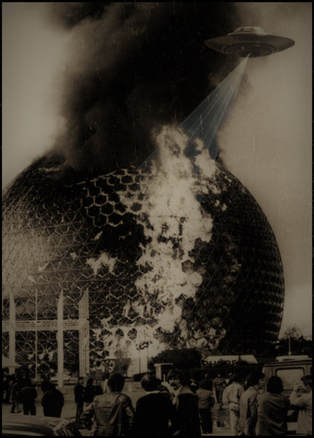|
by David Roden
Gary Shipley’s experimental novel, Warewolff has been marketed as horror (or ‘concept horror’) and duly comes with a brief first person prologue redolent of the opening of Lovecraft’s ‘The Call of Cthulhu’, in which narrator claims that what we are about to read are reliable transcripts documenting the effects of a vast, unthinkably alien, influence. What follows are ten thematic sections: buildings, eyes, families, sky, air, holes, rooms, distortion, screens, ghosts split into texts ranging from terse vignettes like ‘Russian Dog Fail’ (57) to longer sequences of closely regulated incoherence, like ‘Nice Gumbo’ (112), ‘Reptile Christ’ (70) or‘Instagramming Lana Del Rey’s Brain’ (40).
‘Nice Gumbo’ nicely exhibits Shipley’s technique, in which bodily mutilation is always secondary to the violence inflicted on the grammar of concepts. It begins:
We were stale the whole day and miniature in our cut-off legs. This was us christened as invalids.
Implied mutilation – leg severing – disavowed by two incongruous adjectives: ‘stale’ and ‘miniature’. Nothing has happened. Just a christening, it seems, or a change of aspect:
This was us flushing cramps with a bone saw. Look at us, we’re the first of the year.
Deliberate category errors upheap the indeterminacy: cramps are not flushable if we understand the verb standardly. But can we? If not, what is the inscrutable efficacy of the ‘bone saw’?
Over the bed, beside the crucifix, Kafka’s prostate sealed in a freezer bag. The last of Brod’s salvage so the legend goes. It looks like the Eraserhead baby shrunk in an oven. We love like mad from opposite corners of the room. K is that sweet gangrene in our celibacy in glass. The reference to Kafka’s unfaithful literary executor and the vivid comparison with the mutant offspring in David Lynch’s debut movie is a sensory shot offset by the abstraction of the last sentence where the logic of inclusion falters. If K is ‘sweet gangrene’ what is it to be ‘in’ celibacy. What is it for this, in turn, to be in glass? Can this entity merit a prostate or organ of any kind? Is inclusion, here, transitive? If K is in our celibacy and celibacy is in glass, is K also in glass? One recalls Badiou’s claim in Being and Event that the notion of set and set inclusion cannot be explicitly defined outside of systems of axioms such as Zermelo-Fraenkel set theory.[1] All we can say about inclusion or set membership is given in the relevant axioms of the relevant system. For example, those in ZF excluding self-membership. Yet, while it might make sense to talk of an implicit mastery of set theoretic axioms without a concept of set, this is not possible with Shipley’s text, which like Bellmer’s anagrammatic doll, has no rule beyond the hazard of its dispersal. In the prologue Shipley’s narrator writes that the alien force he is soliciting learned to talk by ‘shaping the stories of its victims and, in so doing, created ‘a portrait of itself – of itself made up with other things’ (9).
Warewolff has no people, no worlds; only disjointed clones, plucky carcasses and scripts we once mistook as our lives. Yet despite this ontological poverty something happens that we can read and follow if not understand. This is not a book about a horror – this dispersal is the horror of biomorphism: a condition somewhat like life that, like Shipley’s alien, ‘discloses its arrangements’ through our language centers.
[1] ‘It is of the very essence of set theory to only possess an implicit mastery of its ‘objects’ (multiplicities, sets): these multiplicities are deployed in an axiom-system in which the property “to be a set” does not figure’ (Badiou 2006, 43)
Badiou, A. 2006. Being and Event. Oliver Feltham (tr). London: Continuum. Shipley, Gary J. 2017. Warewolff. London: Hexus Press.
taken from:
0 Comments
Leave a Reply. |
Steven Craig Hickman - The Intelligence of Capital: The Collapse of Politics in Contemporary Society
Steven Craig Hickman - Hyperstition: Technorevisionism – Influencing, Modifying and Updating Reality
Archives
April 2020
|

 RSS Feed
RSS Feed
